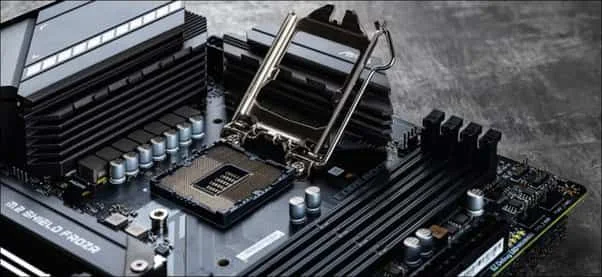
When we play games, different things affect how well the games function. One essential thing is the motherboard. It's like the boss that connects all the essential parts of the computer, like the brain (processor), memory, and graphics card. Now, does the motherboard make games better? Let's talk about it.
Compatibility Matters:
The motherboard determines which processors and memory modules it can accommodate. If you choose a motherboard that is not compatible with the latest gaming processors or has limited RAM slots, it can restrict your gaming performance. It's like having a high-performance engine in a car with a small fuel tank—it won't operate optimally.
Graphics Card Support:
Modern games demand sophisticated graphics processing units (GPUs). The motherboard supplies the slot where the graphics card is installed. Some motherboards support multiple graphics cards for enhanced performance, while others may have limitations. Choosing a motherboard with the appropriate PCIe slots for your graphics card can make a significant difference in gaming visuals and frame rates.
Data Transfer Speeds:
The pace at which data travels between different components is crucial for gaming performance. Motherboards come with different data transfer standards, such as USB, SATA, and M.2. If your motherboard supports faster data transfer rates, it can reduce loading times and enhance overall gaming responsiveness.
Overclocking Capabilities:
Overclocking is a technique used by gamers to stretch their hardware beyond standard performance levels. Some motherboards are designed with superior power delivery and cooling systems, making them more suitable for overclocking. Choosing a motherboard with robust overclocking capabilities can enable additional performance from your gaming components.
Audio Quality:
While not directly related to frame rates, the motherboard's audio capabilities can enhance the gaming experience. High-quality audio components on a motherboard can provide clearer sound, enhancing your immersion in the gaming environment.
Can a motherboard help my games run faster and smoother?
Yes, the choice of motherboard can influence how quickly and smoothly your games run, although it's not the only factor at play. A motherboard affects gaming performance by determining compatibility with other crucial components like the processor, graphics card, and memory.
A high-quality motherboard with robust features, such as support for faster data transfer standards (like PCIe 4.0), optimized power delivery systems, and compatibility with the latest gaming processors, can contribute to enhanced gaming performance. It assures efficient communication between the essential components, reducing bottlenecks and enhancing overall responsiveness.
However, it's important to note that while a decent motherboard is beneficial, other factors such as the graphics card, processor, and sufficient RAM also play vital roles in determining gaming performance. It's a combination of these components functioning together that results in faster and smoother gameplay.
Do all motherboards support the same varieties of gaming processors?
No, not all motherboards support the same categories of gaming processors. Motherboards are designed to be compatible with specific processor socket varieties. For instance, an Intel processor requires a motherboard with an Intel-compatible socket, and the same holds for AMD processors. It's crucial to verify the compatibility between your chosen processor and the motherboard.
Additionally, motherboards may have different power delivery capabilities, affecting their ability to support high-performance processors, particularly those designed for gaming. Before purchasing a motherboard, it's essential to ensure that it is compatible with the specific gaming processor you plan to use.
Conclusion:
In basic terms, yes, the motherboard does affect gaming performance. Choosing the correct motherboard involves considering factors like compatibility, graphics card support, data transfer speeds, overclocking capabilities, and audio quality.
While a motherboard alone won't magically turn a low-end system into a gaming powerhouse, selecting the appropriate motherboard for your gaming requirements can contribute to a smoother and more enjoyable gaming experience.
Some Frequently Asked Questions
How does the choice of motherboard influence gaming performance?
The motherboard functions as the central connection point for key components like the processor and graphics card. Choosing a motherboard with compatibility with the latest gaming processors and graphics cards can substantially influence gaming performance.
Do all motherboards support the same graphics cards?
No, different motherboards come with varying PCIe slot configurations, influencing the support for graphics cards. It's essential to ensure that your chosen motherboard has the appropriate PCIe slots to accommodate your graphics card for optimal gaming visuals.
Can a motherboard enhance loading times in games?
Yes, the data transfer speeds of a motherboard play a role in loading periods. Motherboards with faster data transmission standards, such as M.2 slots for NVMe SSDs, can contribute to quicker loading times and an overall more responsive gaming experience.
Is overclocking only dependent on the processor, or does the motherboard matter?
Both the processor and motherboard play crucial roles in overclocking. Some motherboards are designed with superior power delivery and cooling systems, making them more suitable for overclocking. Choosing a motherboard with robust overclocking capabilities can help unleash additional performance from your gaming components.
Do all motherboards have the same audio fidelity for gaming?
No, the audio capabilities of motherboards can vary. High-quality audio components on a motherboard contribute to clearer sound during gaming, augmenting the overall gaming experience. Consider the audio features of a motherboard if audio quality is essential to you.
Can upgrading just the motherboard enhance gaming performance?
While upgrading the motherboard alone won't dramatically transform a system, it can have a notable impact on gaming performance when combined with other compatible components. However, it's crucial to consider the overall compatibility and limitations of your existing hardware when upgrading a motherboard for gaming purposes.